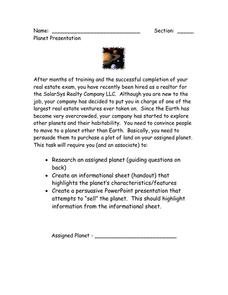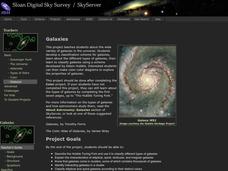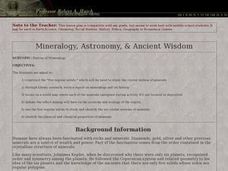NASA
Taking Apart the Light
Break down light into spectra. Scholars learn how atoms emit and absorb photons and come to understand how this process allows scientists to identify different atoms based on either absorption lines or emission lines. Learners then...
Mr. Jones's Science Class
Planet Presentation
Upper-elementary astronomers take on the role of interplanetary real estate salesmen. They research an assigned planet and create a PowerPoint to persuade the rest of the class to purchase property and move there. This fun project would...
Curated OER
`Great Debate' Lesson Plan for Undergraduates
Students study the Curtis- Shapley debate which highlighted the view of human place in the universe. They examine the clash of these two astronomers in a debate which took place in 1920.
Curated OER
Cosmic Poetry: Words and Ideas Bring the Cosmos to Life
Sixth graders study the cosmos and their thoughts and feelings about the universe. In this cosmic poetry instructional activity students create a venue where they can "safely" ask questions and discuss ideas.
Curated OER
How Do We Know...?
Students identify and explain how various inventions and astronomers have improved our appreciation of the universe. Students identify at least two constellations in the sky and discuss how they were used in ancient times to tell time...
Curated OER
Uranus, Neptune, and Pluto
In this planets instructional activity, students read information about Uranus, Neptune, and Pluto and then complete 18 multiple choice, 4 true or false, and 2 fill in the blank questions.
Curated OER
Good Timing
Students investigate time, how people measure it, and how it influences our lives. They complete an online Webquest, analyze various calendars, answer discussion questions, and identify references to time in a newspaper article.
Curated OER
Reach for the Stars
Fifth graders select Greek Mythological characters to research. They gather research and keep notes on Inspiration. Students are to answer the question, "Which mythological character do you feel is the most worthy of being a...
Curated OER
Start the Space Flight Time Line
Students research space flight exploration and technology. In small groups, they research a significant event from early time until the start of the space age. A class time line is created from the research groups.
Curated OER
Momentum
Students learn the concepts of momentum and its conservation, using the recoil of a cannon as an example. They examine how momentum is a vector, allowing its conservation to be applied to problems in 2 and 3 dimensions.
Curated OER
The KAO Telescope
Students explore the basic principles of the operation of the NASA's KAO telescope. They construct a simplified model of it using film canisters and other everyday objects. Step by step directions are included in plan.
Curated OER
Galaxies
Students use the provided website to classify galaxies after exploring information about elliptical, spiral, lenticular, and irregular galaxies and using the Hubble Tuning Fork.
Curated OER
Planets Curriculum
Pupils investigate the planets in our solar system. They conduct research using a variety of resources in order for students to make cognitive connections with the demonstrations made by the teacher. Pupils discover how to recognize the...
Curated OER
Star Search
Seventh graders explore stars. In this star lesson, 7th graders apply generalities about space objects to constellations and explore the differences between radio waves and light waves by answering essential questions in their research.
Curated OER
Deep Impact Comet On A Stick
Students investigate the concept of a comet. They construct a model of a comet. The design is done using the same thoughts of an engineer. Students work together to discuss the strengths and weaknesses of the comet models. If the model...
Curated OER
Kids in Outer Space
Students explore outer space through various activities. In this outer space lesson plan, students read the book Outer Space and The Mice on the Moon. Students work in groups to build their own space ships.
Curated OER
Following in Galileo's Footsteps
Students explore the findings of Galileo and research the moons of Jupiter. They construct simple telescopes, and examine the moons for themselves at a star party. They record their findings in a journal.
Curated OER
Puzzling Planets
Students examine the concept of a solar system. In this research based lesson, students compare a star and a planet. They explain the requirements for life in a biosphere.
Curated OER
Having Tea Among The Stars
Pupils study the struggles and achievements of women in the field of astronomy. They create comparisons of the lives of these women through research. They write a vignette with their group that describes these women sitting down to tea...
Curated OER
A DISAPPEARING ACT Astronomy: Do Stars Always Shine?
Students observe why stars are not visible during the day with a classroom demonstration using an index card punched with holes.
Curated OER
Stargazing Astronomy: A Ceiling Full of Stars
Students make an observe a planetarium using a can with nail holes, black paper and a flashlight.
Curated OER
Astronomy With a Stick
Students find the altitude of the Sun at 10 A.M., at solar noon, and at 2 P.M. by measuring the height of the gnomon and the length of the shadow at each time. They record the measurements in their notebooks for later conversion.
Curated OER
Mineralogy, Astronomy, & Ancient Wisdom
Students complete a variety of activities surrounding minerals, crystals, and mineralogy. They locate common minerals on a world map, complete a lab in which they identify the chemical and physical properties of various minerals, etc.
Curated OER
Astronomy: Picture Time
Young scholars investigate how to tell time by observing the placement of objects in the sky. Researching on the Internet, they locate the time for sunrise and sunset, the time the full moon rises, and the difference between clock and...
Other popular searches
- Astronomy and Space Science
- Space Science Astronomy
- Science Astronomy Stars
- Earth Science Astronomy
- Science Astronomy Graphing
- Life Science Astronomy
- "Astronomy and Space Science

























